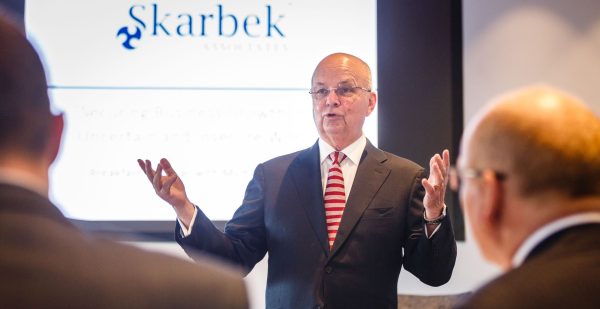General Michael Hayden, former director of the National Security Agency and the CIA and now a commentator on world affairs for CNN, recently painted a sombre picture of the world we live in and the challenges we face in business over the next 10 years, to an audience of business leaders, general counsel and managing partners at an event hosted by Skarbek Associates in London.
While the world may have seen more dangerous times, the General said that rarely has the situation of international security been more complex. He summarised the major factors affecting world security, which he categorised as ‘tectonics’.
Tectonic 1: The Nature of Power
Non-state actors are now able to exert disproportionate influence due to malign global networks, both physical and virtual. Terrorism, criminal activity and cyber crime all represent destabilising influences that require new forms of deterrent. Failed states, the diasporas that support them and, of course, old-fashioned state-sponsorship have helped create an undercurrent of discontent that seeks to challenge the status quo. Religious movements, demographics and economic uncertainty point towards a future in which a ‘quick fix’ is unlikely. The challenge is to protect hard-won freedoms while maintaining security.
Tectonic 2: What Once Seemed Permanent is Not
Globalisation, and its affect on the nation state, is being matched by an unpicking of the political map and institutions set in train by the P5 at the end of World War II. The Arab Spring and post-9/11 US-NATO military adventures are manifestations of a redrawing of maps. This is most stark in the Middle East where the lines drawn by Messrs Sykes and Picot at the end of World War 1 are under stress. Conflict in Libya, Syria, Iraq and Yemen, fuelled by coalitions gathering around Iran and House of Saud, are at the heart of this re-ordering, and religious and cultural differences make a drawn-out struggle likely.
Tectonic 3: Beware Nation States that are Brittle – and Nuclear
Among the power shifts we also face the spectre of brittle, ambitious and nuclear powers. North Korea’s leader exemplifies this as he delights in tormenting America while shoring up his own position with public displays of strength. His nuclear programme is progressing and there is little to suggest wisdom following in its wake.
Tectonic 4: The Rise of China
There is much debate around the inevitability of the rise of China, whose growth and influence is shifting power East, and many sources of potential conflict. General Hayden quoted from the work of Professor Graham T Allison, who coined the phrase the ‘Thucydides Trap’ – when a rising power causes fear in an established power which escalates toward war.
Thucydides wrote: “What made war inevitable was the growth of Athenian power and the fear this caused in Sparta.”
A study of 16 cases of rising powers over 500 years shows that 12 ended in war.
Tectonic 5: Whither America?
As Tectonic 4 suggests, the attitude and approach of the US will play a crucial role in the security landscape of the 21st century, and with it economic stability. While this is a statement of the obvious, no-one yet knows where President Trump will lead his country. Whichever routes Trump and other world leaders choose to travel, we must be braced for a bumpy ride.
So What?
As tectonic movements give rise to earthquakes, General Hayden chose his metaphor carefully. Businesses need leaders who acknowledge the future is complex and uncertain and do not either bury their heads in the sand or dwell in unwarranted optimism.
Now is the time to conduct scenario-planning exercises and find strategic paths whereby a business can survive and succeed in a range of ‘worlds’. It is the time to stress-test operating plans, just as the CIA regularly conducts ‘Red-Team’ events to test plans and build resilience.
General Hayden finished by confessing that most of his career had been focused on urgent and low-importance issues, how many of us would confess to the same?
